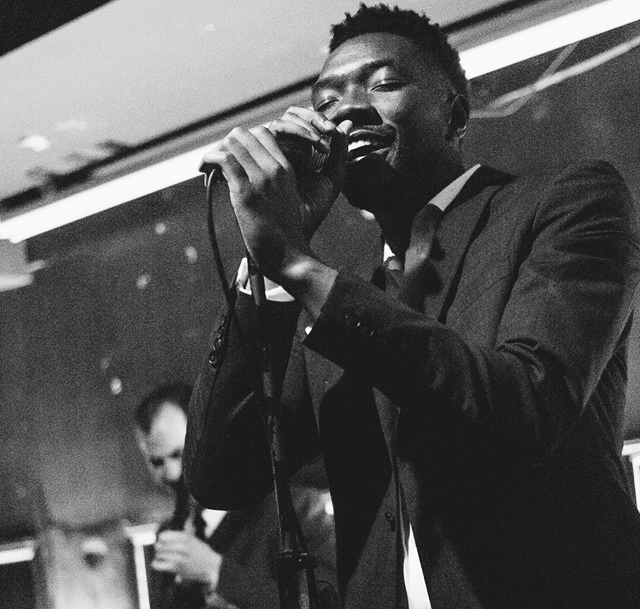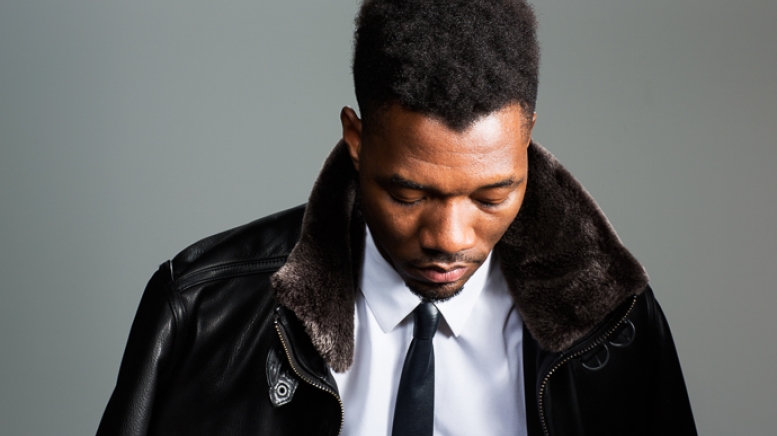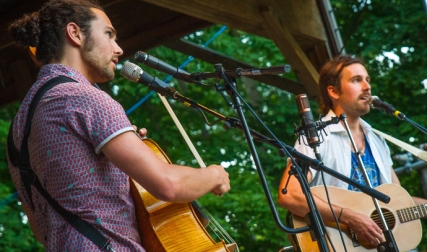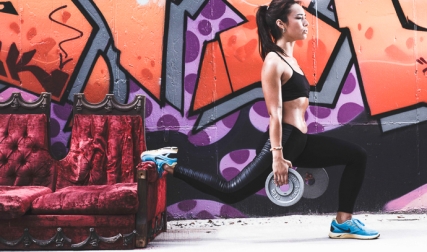How would you describe your sound?
Soul music, but it’s not typical soul. I’m inspired by R&B, neo-soul, Motown, jazz and hip-hop. Those genres fuse to make my sound, but when you hear my music you wouldn’t think that.
Who are some of your biggest inspirations?
I grew up listening to the Temptations, Marvin Gaye and Sam Cooke. Then there’s Whitney Houston, Brandy, Boyz II Men, Lauryn Hill, Erykah Badu and the whole neo-soul movement. Having grown up in the 1990s, I love hip-hop beats and Afro-Caribbean rhythms as well. I try to combine all that together to create cool sounds. That’s why my music doesn’t necessarily fit 100 percent in any one genre.
When did you start performing?
I grew up in the Baptist church and my mom had me in different church choirs from an early age. I was in youth choirs all throughout my childhood, and then in high school I joined the gospel choir. I went to the same public high school as Lauryn Hill of the Fugees. She directed the gospel choir that I would eventually direct during my senior year.
Did she ever get to hear you sing?
No. I’ve always tried to get that connection with her, but she graduated a few years before I even entered high school. That legacy definitely fueled me to really embrace the arts, even though back then I wasn’t seeing music as something I would do long-term—it was just something I really loved. I didn’t realize how important music was for me until I got to Dartmouth.
Had you planned on joining an a cappella group at Dartmouth?
Not at all. I had planned to join the Dartmouth gospel choir, but my good friend Derrick Smith ’07—we went to middle school together—was super excited about a cappella and wanted me to audition with him. I actually avoided Derrick on the day of auditions because I didn’t want to do a cappella. I waited until after the first few rounds of auditions were over before going down to the Hop to check my mail. When I got to my Hinman box Derrick came running up to tell me that I had already made it to round three of auditions. I went downstairs to the rehearsal room to tell the director that there must have been some mistake. He asked me to sing some scales anyway. They basically finagled me into the auditions, so I decided to just keep going with it.
How did it turn out?
Luckily, I ended up being one of the four singers selected for the Dartmouth Aires that year. I didn’t know what I was signing up for, but because of the Aires I had so many wonderful experiences—from traveling to Boston for alumni shows to doing two tours a year and going to Europe for the first time. I’ve always been a bit of a loner, so the experience really helped me bond. I didn’t pledge any fraternity, but the Aires essentially became my brotherhood.
You tried out for American Idol after college. How did that audition go?
I auditioned for season seven in South Carolina. American Idol is not like how they pitch it on TV. There are maybe eight or nine rounds before you even get to the main judges. Initially there’s a cattle call when you’re in the stadium with 50,000 other people. I got through the first few rounds and was given the golden ticket. Then I found out the next round was two months later. When I flew back to South Carolina, I had booked a hotel for three days, thinking I’d get through all the rounds. I got cut at the end of day one—two rounds before I would have even seen Simon, Paula and Randy, who were then the main judges. Since I was stuck down there for two more days, I just went to this open-air mall every night and started writing lyrics in my journal. That failure with American Idol ended up being the trigger for me to continue down my own musical path.
Tell me about “Honeydrip,” the first single you released back in 2013.
It was pure happenstance. When I was living back home in New Jersey I used to go into the city to the Village Underground, where there’s this world renowned open mic. I’d sing there and sometimes I’d fail, sometimes I’d do well, but it was all about growing. A couple years later, after I had moved to Brooklyn, I decided to go to the open mic one more time. I sang Sam Cooke’s “A Change is Gonna Come” and it went really well. This Italian producer, Raffa Scoccia, happened to be in the audience that day and he handed me his card as I was walking off the stage. I didn’t really consider myself an artist at the time, but I was trying to embrace as many opportunities as possible, so I emailed him to meet up. Turns out he was a house musician. I had never listened to house, but I liked the beats and since it stems from disco I felt at home when I heard his music. I sang one of my R&B songs, “Honey,” on top of his house beats. He thought it sounded amazing, so he set up a mic in his closet and told me to go in and sing. He recorded my song, mixed it with his beats, and we released it as “Honey Drip.” It did really well—it peaked at number 13 on the charts.
Which charts—Billboard?
No, it was Traxsource, where basically all DJs around the world go to buy their music for their different sets. It’s a really important chart—like a Billboard for house music.
What sort of attention did the song get?
When that track was released, I had people in Africa and the United Kingdom and the West Indies sending me messages and tweeting at me. Fans were finding me online to say that they wanted to meet me one day and that they loved my music. I had about 5,000 new followers in South Africa alone. I remember a girl from Botswana told me she was playing my music in her car and people were coming up to ask her about it. After getting all this encouragement from people around the world, I started to realize that being an artist isn’t something you strive to be, it’s something that you just are by doing what you love. As a result, I started to embrace it more and more.
It sounds a little like the story of Rodriguez in Searching for Sugar Man, except that you’re actually aware of your fanbase in southern Africa.
I’ve heard that said so many times. I still haven’t seen that documentary, but now I know the story. I’ve just been ridiculously blessed and have now gotten to perform at some pretty respectable venues like Webster Hall and The Shrine in Harlem.

And you just performed at a CMJ Music Marathon showcase of new artists in New York City this past fall. How did that go?
It was my best show to date. A great crowd came out and they were really into it. When I left the stage, everyone told me I seemed so free up there. That is the ultimate compliment because as an artist that’s what you want to be and that’s when people connect with you the most. That gig taught me that I can entertain at an international festival and that people think what I’m doing is worthwhile.
What were you doing in the years between your American Idol audition and your first single release in 2013?
I was being a typical Dartmouth grad and trying to get my professional life in order. It’s extremely difficult to be successful in the music industry, so I worked in a few different jobs during those years. My first job was at a multicultural marketing firm. I was good at it, but I hated it, so I quit. It was the height of the recession and I ended up unemployed for 8 months. It turned out to be a pivotal time. While living at home and applying for jobs left and right, I was encouraged to start my own blog. It was called the Recent Graduate Chronicles and featured a few other Dartmouth alumni bloggers. I taught myself to do social media marketing and HTML editing for the blog, and after a few months it gained traction and I found myself covering music events and CD releases. Then one day I saw a posting on Craigslist for a job at a music licensing company. Without that eight-month hiatus, I would not have had the experience to apply for and get that position.
Are you still doing music supervision?
I started my own company with a business partner in 2014, but it’s very much freelance work. It’s a great way to create opportunities for other musicians and to actually gain more knowledge about how the music industry works. A licensing spot might bring in $10,000 or sometimes even $50,000, which goes a long way for a band or an independent artist. My end goal is to have my own artist consultation company, where I can leverage my clout as a performing artist to bring attention to other deserving artists.
What’s your process for writing lyrics and arranging music?
All of my music is created and arranged a cappella style at first. I’ll sing a bassline, I’ll beat box the rhythm, I’ll sing falsetto, and from there I’ll craft the piece by singing all the parts of the arrangement before finding instrumentalists to record the track. I listen to the arrangement to gauge the emotion of the piece and that guides me in writing the lyrics. I’ve made a habit of going up to the roof of my Bushwick apartment at 7 a.m. with just my pad for writing lyrics—it’s worked out pretty well.
What are you working on now?
I’m applying to perform at festivals in 2016 and I’m shooting for South by Southwest, some soul music events and some festivals in Canada. I have a few songs that are currently being mixed and I’m working with artists in Italy and the Netherlands on soulful house collaborations, one of which is coming out in mid-February. I’m also trying to put together a showcase of other up-and-coming soul and hip-hop acts in New York City.
What do you find most challenging about pursuing a music performance career?
Honestly, it’s that you can’t really see how to make this a career. The money just isn’t there. But, again, I’m not even looking for the payout, this is just something I’m doing because I love it.
This interview has been edited for clarity and length. Photos, audio and video courtesy Jarrett Cato.



